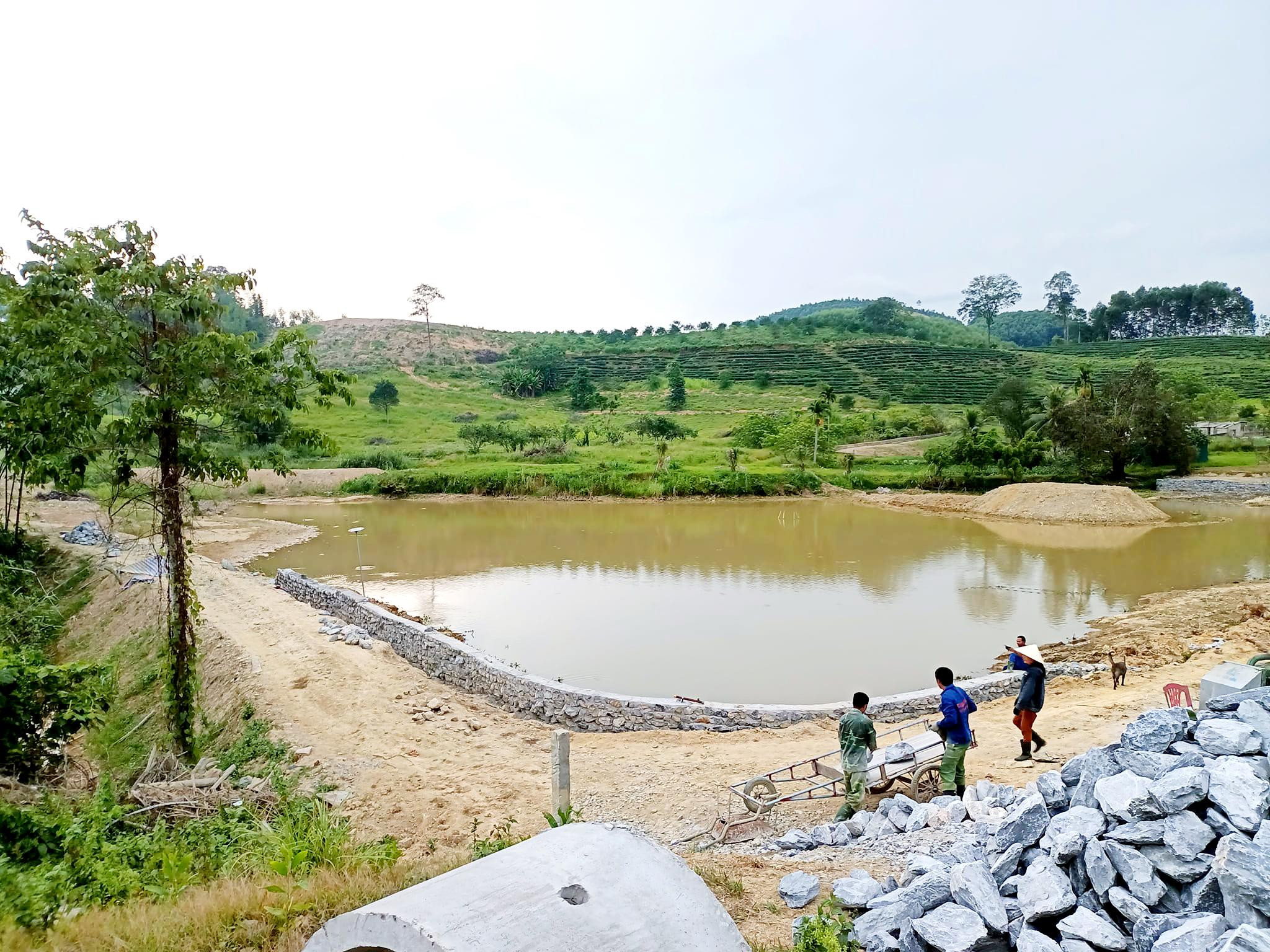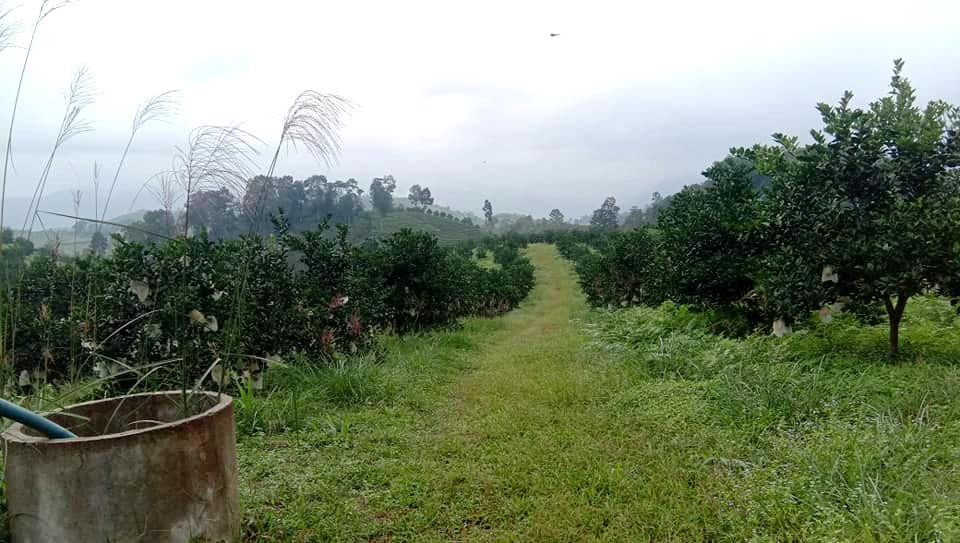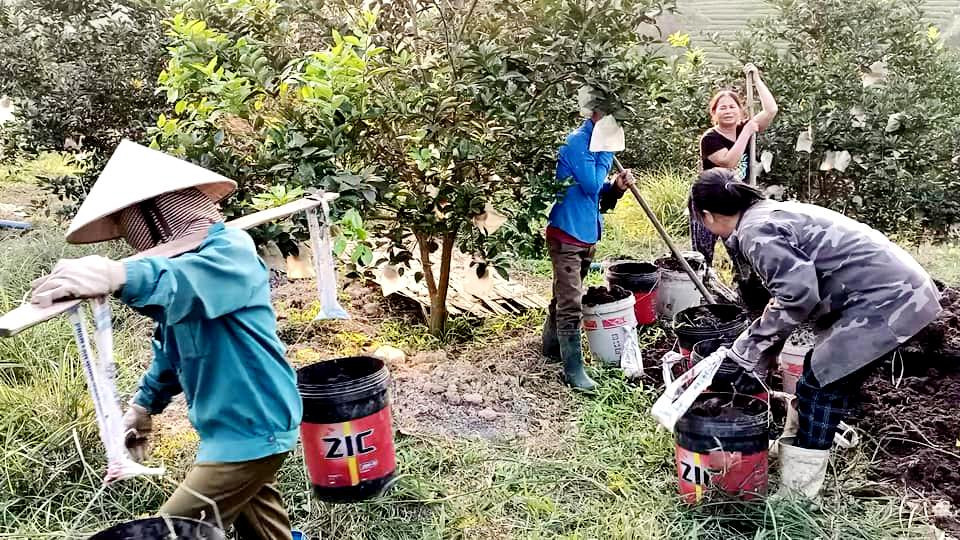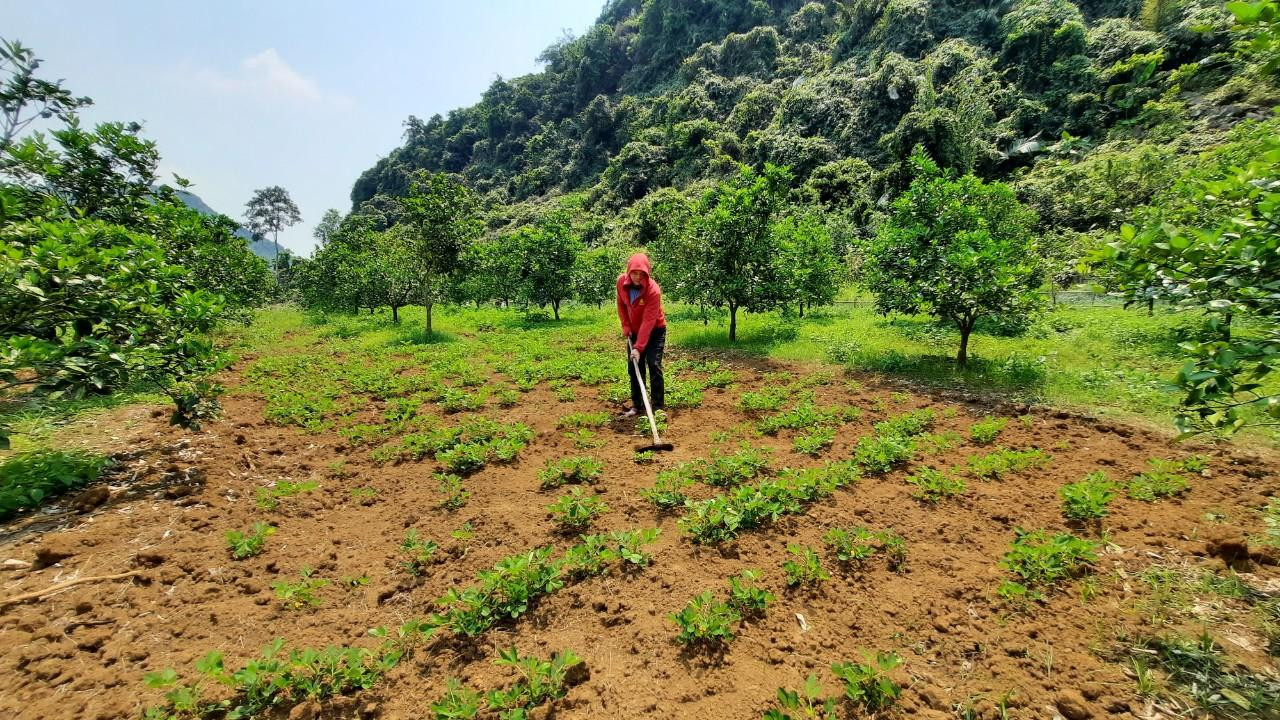Hot weather, farmers find ways to water their 'million dollar' crops
(Baonghean.vn) - Nghe An is currently entering a period of intense heat and prolonged drought, and orange trees are in the stage of storing water for fruit. Building ponds to store water, using organic microbial fertilizers and utilizing weeds to cover the roots, implementing intercropping measures... are methods applied by Nghe An farmers to combat drought for their "million-dollar" crops, providing enough water for orange trees to nourish the fruit.
 |
| To proactively source water for irrigating 6 hectares of oranges, Mr. Tran Dien Vi invested hundreds of millions of dong to build ponds and store water. Photo: Thanh Phuc |
Plant 6 hectares of oranges according toorganic direction, Mr. Tran Dien Vi (Suong hamlet, Thanh Duc commune, Thanh Chuong) has invested in an automatic root irrigation system and pulled pipes to irrigate the orange trees. This summer, to ensure a stable and abundant water source for thousands of orange trees during the fruit-nourishing and water-storing stage, he has invested hundreds of millions of dong to build a pond to retain water.
Mr. Tran Dien Vi said: “Oranges are a type of crop that is not resistant to drought. Summer is the period for the tree to grow and store water in the fruit, so if not carefully cared for, it will greatly affect the quality and yield. Therefore, in order for the orange garden to achieve high productivity, from the beginning of the dry season, the family has carefully prepared heat-resistant measures for oranges, such as: adding an irrigation system, using grass to cover the roots of the oranges, applying biological fertilizer to prevent drought and regulate the growth of orange trees...".
 |
| To help weeds grow well, using biological products to provide microorganisms to develop and make the soil loose and airy is an effective way to prevent drought for oranges. Photo: Thanh Phuc |
ToanTan Ky districtThere are nearly 170 hectares of orange trees. Currently, the orange trees are in the fruit-nourishing and water-accumulating stage. This year, the flowering and fruit-setting rate of oranges is lower than previous years, so the prolonged hot weather during this important stage greatly affects the orange yield at the end of the season.
Although the dry season has just begun, the canals and dams around the orange gardens are almost dry, and orange growers are very worried. Therefore, in addition to taking advantage of available water sources, households have invested in drilling wells to have a stable water source for irrigation against drought. In recent years, the use of microbial fertilizers is considered a "waterless drought-fighting" solution that has been effectively and widely implemented in Tan Ky.
Mr. Truong Phu Tuan's household in Tan Yen hamlet (Tan Phu commune, Tan Ky) grows 1.2 hectares of oranges. In 2021, the oranges rotted and fell off in large numbers on the day of harvest, causing a loss of hundreds of millions of dong. Entering this year's orange crop, the flowering and fruiting rate was low. Currently, the oranges are in the fruit-nourishing stage, storing water for fruit, but are facing intense heat, so he is very worried.
 |
Using organic fertilizer to fertilize oranges is considered a way to combat drought without water by farmers in many orange growing areas. Photo: Thanh Phuc |
To have water to irrigate the oranges, he took advantage of the surrounding streams and streams; drilled wells to proactively source water, and at the same time, applied microbial fertilizers to both provide nutrients and keep the orange trees moist. On the other hand, to let the weeds grow well in the orange gardens, he watered with preparations to provide microorganisms to develop, loosen the soil and make it airy. With this method, despite the hot sun and the strong Lao wind, his orange garden is still green and the fruit grows.
Mr. Nguyen Thanh Phuong -Chairman of Tan Ky District Farmers' Associationsaid: “In recent years, orange trees have been the main crop bringing high income to Tan Ky farmers. Drought prevention for orange trees has been of interest and investment to farmers. In addition to irrigation and intercropping to keep the soil moist, the solution of using organic microbial fertilizers is also very effective and is being widely replicated in all localities. This is the best and least expensive drought prevention solution.”
 |
| Intercropping peanuts, beans, melons, squash, etc. in orange gardens is also a way to keep the soil moist, helping to save water for irrigating orange trees. Photo: Thanh Phuc |
Farmers in the orange “capital” of Quy Hop have a way to combat drought by intercropping peanuts, melons, and squash in their orange gardens. Thanks to this intercropping method, the soil retains moisture better and is more porous, so the orange trees are less dry.
Mr. Hoang Van Hoan (Xuan Son hamlet, Van Loi commune, Quy Hop) said: "In 500 orange trees that are in the fruiting stage, I intercrop melons and peanuts to increase economic efficiency and help keep moisture and prevent drought for the orange trees. Planting melons in furrows between rows of oranges, covered with perforated plastic, watering the melons every day, the water seeps into the ground, soaks in longer and keeps moisture longer, saving the need to water the oranges regularly."
PresentlyNghe Anis entering a period of intense heat and prolonged drought, and orange trees are in the stage of storing water for fruit. Therefore, if there is not enough water for irrigation and humidity, it will significantly affect the yield and quality of oranges. In recent times, farmers in orange growing areas have been proactive and active with many plans to combat drought for orange trees, so currently orange gardens are growing and developing well, not being negatively affected by extreme weather./.


